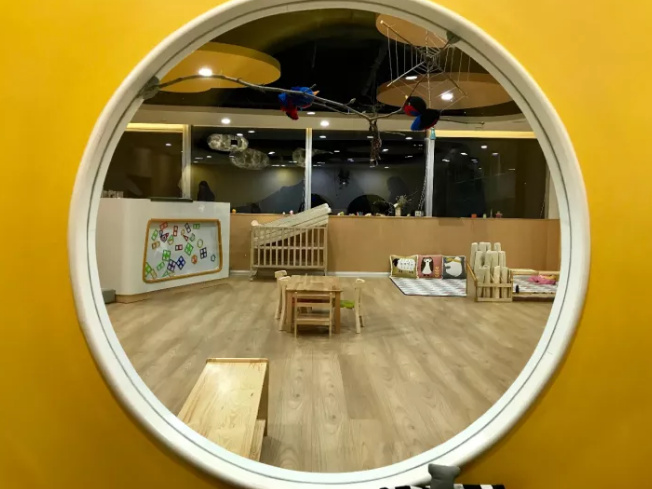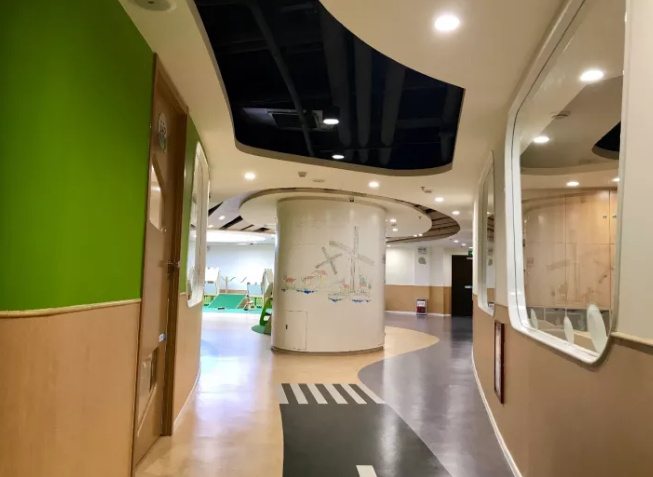The report of the 19th National Congress of the Communist Party of China stated that it is necessary to adhere to the protection and improvement of people's livelihood in development, to have education in childhood, to learn to teach, to have labor, to have medical care, to be old, to live, to live in a weak place. The support has been continuously making new progress. “Youth has a good education†ranks first in the new progress of people's livelihood, which shows the importance of status. "Young children have education", who should be educated, how to educate, this has become a topic of public concern, especially since the full release of the two-child birth in 2016, all sectors of society are calling for the return of childcare services.

On November 23, MoreCare held a launching ceremony in China's Jinan, Shandong Province, and a white paper on China's nursery industry. MoreCare and Tencent Education jointly released the first white paper on China's 0-3 year old child care service industry. "We have reviewed the development of the institution since the founding of New China, and the policy changes in China's early childhood education. We also introduced the experiences and practices of some countries and regions in overseas care. We hope that this white paper will serve the child care. The return of the industry provides historical references and overseas references, and provides some responses to the needs of Chinese parents' current urgent care services." MoreCare Mao Wei CEO Jiang Wei said.
In the 1980s, nurseries were once spread across urban and rural areas, especially in large enterprises and institutions in the city. Nurseries became standard and provided great convenience for parents' work, but the nursery school almost disappeared. How did the Chinese nursery school disappear? The white paper study found that China's 0-3 year old child care service has undergone a process of starting, establishing and dissolving. “After the founding of New China, learning from the experience of the former Soviet Union, some factories and mines began to set up nurseries and kindergartens. In the 1950s and 1960s, the nurseries in factories and mines were a kind of welfare service for employees under the planned economic system. This is the initial stage of the nursery service. From 1977 to 1996, this period was the establishment period of the nursery service system. The nursery changed from welfare service to socialization, but it was still welfare. Jiang Yan introduced.
According to the white paper, at the end of 1980, there were 988,000 nurseries and kindergartens in 22 provinces across the country, and 34.74 million children were enrolled. The enrollment rate has reached 28.2%. By 1995, there were nearly 450,000 nurseries and kindergartens at all levels, including more than 260,000 nurseries and 180,000 kindergartens. Before and after 1995, urban children entered the park with a rate of 70%, and rural children’s enrollment rate reached 32%.
From 1997 to 2005, with the transformation of China's economic system, state-owned enterprises deepened reforms, comprehensively established a modern enterprise system, divested social service functions such as childcare institutions, and the decline of China's birth population. The decline has been reduced, especially in the kindergartens run by the collectives. The number of nurseries has also suffered the same fate, and the reduction has been more thorough. There are very few nurseries in most cities. It can be said that the nursery school almost disappeared during this period.

Jiang Wei said that reviewing the development history of China's childcare institutions has important reference significance for the return of childcare services in the future. "At that time, there were various nurseries, and the state encouraged collectives, streets, and even families and individuals to set up nurseries. The demand for society is not high, and it fully mobilizes social forces to meet the needs of the family."
From the perspective of some developed countries in the West, these 20 years have attached great importance to the early education and development of infants and young children. On the one hand, the early development of infants and young children has been incorporated into the public functions of the government, on the other hand, policies have been promulgated, laws and regulations have been promulgated, and industry standards have been formulated. Fully mobilize the power of the market to meet the needs of the community. In September 2008, the UK enacted a new Early Years Foundation Stage (EYFS) and incorporated the English Childcare Act 2006 to promote early childhood education for children aged 0-5. Development will lay a solid foundation for children's future study and life. The EYFS system consists of seven areas of study, including 28 early education goals, 117 evaluation criteria, and a unified assessment of all child care institutions. The development of the US nursery market is relatively mature, and each state has legislative requirements for various day-care standards.
In Taiwan, in recent years, in recent years, the public care center has been actively promoted. In the form of public-run private enterprises, the government provides venues and funds, and introduces social organizations and schools through bidding. At the same time, the Taiwan region is also actively regulating the development of private and individual childcare centers. Private and individual child care centers need to meet the set standards set by the government and obtain certificates related to housing safety, fire protection and food arrangements before they can register with the Social Affairs Bureau. License letter.
Currently, among OECD countries, the average enrollment rate for children under 3 is 34%. The enrollment rate of Chinese infants and young children in various types of care institutions is only 4.1%. The enrollment rate of children under 3 years old in Chinese cities is less than 10%. It can be said that there is a big gap with developed countries. According to a survey organized by the National Health and Family Planning Committee in 2016, the current demand for nursery services for infants and young children is relatively strong, and the contradiction between supply and demand of infant care services is more prominent. Of the mothers who were investigated who had given birth to a child and were not planning to have two children, 60.7% were due to the fact that the child was left unattended. Nearly one-third of the full-time mothers surveyed were forced to suspend employment because they were left unattended; more than three-quarters of full-time mothers said that if someone helped bring their children, they would be re-employed.
According to the white paper, at present, the overall characteristics of China's 0-3 year old child care industry are: the number of care institutions is seriously scarce, the supervisory and regulatory departments are not clear, the relevant regulations and policies are lacking, the industry standards are missing, and the social forces have difficulty in setting up care institutions. Heavy. Fortunately, the top leaders of the country have noticed this problem. On June 13, 2017, Vice Premier Liu Yandong emphasized at the symposium on promoting children's health development that it is necessary to focus on the new needs after the implementation of the comprehensive two-child policy and to promote the development of nursery services and inclusive preschool education. Since the beginning of this year, the Office of the Women and Children's Center of the State Council has organized research groups in the “0-3 year old children's care public service and policy support†in Shanghai, Shandong, Sichuan and other places. According to media reports, the National Health and Family Planning Commission has been studying documents to promote guidance on the development of infant care services for children aged 0 to 3.
Jiang Wei believes that the mode of raising children under the age of 3 has experienced a pattern from family care to collective care, and then to the family care. With the strong call of the society for the demand of child care in the recent years, the future specialization and scientificization There will be more and more nursery institutions, and professionally raising and educating children under the age of 3 will become the future development trend. “Children from birth to 3 years old are the key period of brain development and the most plasticity period. Important neuronal connections will be formed (or not formed) during this period. The various experiences of childhood are health, learning and behavior. The trajectory may be through the life of the person. The early education of science is not only conducive to the development of the learning potential of infants and young children, the interest in learning, the enhancement of learning ability, the promotion of children to better adapt to the future study life, and the creation of a lifelong development. A good start, and from a national perspective, promoting early development of children aged 0-3 has enormous social and economic benefits."
The good life of the people should start from a happy family and should start with a doll. Jiang Wei suggested that the society should meet the strong demand for childcare services as soon as possible. At the moment there is no relevant laws and regulations at the national level, “young education†should open the door, set industry standards, and encourage the participation of social forces. Come to the nursery service.
Product name:Flying Insect Killer Brand:YIQUN AEROSOL Volumn:450ml, 600ml, 750ml Certificates:ISO9001, ISO14001, OHSAS18001, REACH, MSDS, CARB VOC, CA65 MOQ 5,000 pieces Formula Customize formula or use our pre-defined formula Can Printing:Design new packaging for you or provide us with your design Sample time:3-5 days Price Terms:EXW, FOB, CIF Payment terms:T/T, LC, Alibaba Insurance Trade.Professional Fly Killer manufacturer is located in China, including Fly Killer Spray,Mosquito Killer Bug,Flying Insect Killer, etc.
Flying Insect Killer Spray,Mosquito Kille Spray,Flying Insect Killer,Insecticide Spray
Linyi Yiqun Packaging Products Co., Ltd , https://www.lypackingbag.com